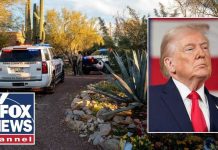
When Ron DeSantis declared war on H-1B visas in Florida’s universities, he didn’t just target a federal immigration program—he lit a match under the Republican Party’s internal fault lines, threatening to upend how America competes for talent in a global race that many voters barely realize they’re losing.
Story Snapshot
- DeSantis orders Florida’s state universities to stop hiring with H-1B visas, shaking up academic and tech circles alike.
- Trump faces backlash from his own base after proposing a $100,000 H-1B visa application fee, stoking division among conservatives.
- Universities, tech companies, and advocacy groups warn the moves could cripple research, innovation, and higher education competitiveness.
- Florida’s experiment is a national flashpoint in the battle over immigration, jobs, and America’s future workforce.
The Day Florida Declared H-1B a Battleground
On October 29, 2025, Ron DeSantis strode onto the University of South Florida campus and issued a command that reverberated far beyond Tampa: the state’s public universities must stop hiring foreign workers through the H-1B visa program. The move, designed to “prioritize American jobs” and root out what DeSantis branded as “cheap labor abuse,” sparked an immediate scramble across university HR departments and state government offices. The directive was more than a policy tweak—it was a thunderclap signaling a new front in the American immigration wars, one aimed squarely at academia and set to pit state prerogative against federal authority.
Hours after DeSantis’s announcement, the Board of Governors began poring over audits detailing the extent of H-1B use within Florida’s sprawling higher education system. Preliminary findings showed hundreds of faculty, researchers, and staff on H-1B visas, many of them occupying roles that universities argue are critical to research and student success. The fallout was swift: universities rushed to review contracts, and academic unions issued statements warning that the state risked “gutting its research capacity and global standing.” The stage was set for a public confrontation in the Board’s upcoming November meeting, where the fate of foreign talent in Florida’s academy would hang in the balance.
Trump’s Fee Shock and the Conservative Divide
Just weeks earlier, Donald Trump had lobbed a grenade of his own into the H-1B debate: a proposal to slap a $100,000 fee on every new visa application. The move, intended to discourage what he called “systemic abuse,” triggered rare blowback from both his populist base and the business wing of the GOP. Tech companies, already anxious about talent shortages, warned of an exodus of high-skilled jobs and a loss of America’s competitive edge. Meanwhile, conservative commentators accused Trump of betraying American workers by even entertaining exceptions for “specialized talent.” The resulting furor exposed a deepening rift inside the party—one between the anti-immigration hardliners and pro-business pragmatists, with both camps accusing the other of selling out the American dream.
The controversy spilled onto social media, with Trump defenders and critics trading barbs over whether America “needs foreign talent” or should “close the door” for good. The spectacle underscored a new political reality: H-1B had become a wedge issue not just between parties, but within them. As Trump recalibrated his message—at times defending the need for foreign expertise, at others vowing to crack down harder—conservative voters and donors alike demanded clarity on what, exactly, the future of American labor would look like.
Universities in the Crossfire: Innovation vs. Nationalism
Florida’s universities, caught in the crosshairs, faced immediate and tangible consequences. The University of Florida, a flagship institution, warned that the ban would jeopardize “groundbreaking research, medical services for vulnerable populations, and advanced training programs needed to keep the state competitive.” Faculty unions went further, questioning whether DeSantis’s directive even had the force of law, and suggesting that the state risked violating both federal hiring statutes and academic freedom. The American Council on Education cautioned that such policies, if replicated nationwide, could drive away international talent and shrink the pipeline of scientific innovation that underpins American prosperity.
Yet, DeSantis’s supporters held firm, insisting that universities had grown too reliant on foreign workers at the expense of American graduates. They cited anecdotal cases of non-critical positions filled by H-1B holders, arguing that the program had strayed from its original mission. The debate over whether the policy was a needed correction or a reckless overreach played out in public hearings, faculty meetings, and cable news segments, with both sides claiming the mantle of common sense and national interest.
What’s Next: Flashpoints, Lawsuits, and a National Reckoning
As the Board of Governors prepared to meet in early November, the political and legal uncertainties only deepened. Universities scrambled to complete internal reviews of their visa hiring practices, while advocacy groups began drafting legal challenges. The outcome could set a precedent for other states, potentially inviting a new wave of state-level crackdowns or, conversely, galvanizing federal intervention to protect academic autonomy.
For H-1B visa holders and their families, the stakes were immediate: job security, legal status, and the possibility of uprooting lives built in the U.S. For students and researchers, the risk was a sudden shortage of instructors and mentors. For the broader public, the question lingered—would America’s drive to “put Americans first” come at the cost of its place as a global leader in science, tech, and higher education? As the dust settles, one thing is clear: the battle over H-1B is no longer just about visas. It’s about who gets to define the future of American opportunity—and what, if anything, the country is willing to risk to win.









